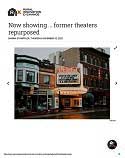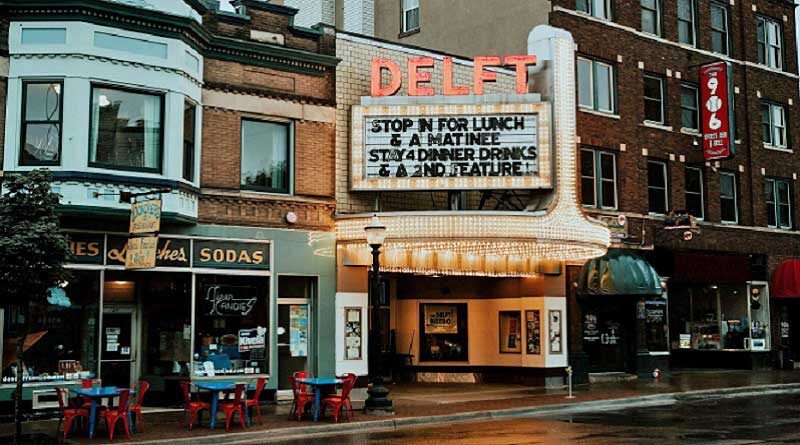Now Showing…Michigan Former Theaters Repurposed

By Dianna Stampfler
Movie theaters began popping up around Michigan more than a century ago, becoming the heart of downtown communities and drawing families out for a night on the town. With the 1980s introduction of cable television, laser discs, VHS and DVDs for in-home viewing as well as multiplex facilities, many small-town theaters began to close. In recent years, there has been a resurgence of restoring these historic movie theaters into different types of public spaces like bars, restaurants, dance studios and even a popular haunted attraction.
Marquette
Downtown Marquette boasts two historic theaters, located directly across the street from each other. The single screen, 650-seat Delft Theater opened in 1914 at 139 W. Washington Street and was ultimately one of five operating in the Upper Peninsula by the Wisconsin-based Delft Theaters Inc. (the others being in Crystal Falls, Escanaba, Iron River and Munising). The Marquette location was renovated in the 1940s and ultimately was expanded into a five-screen theater before being closed in 2012.
Today, The Delft Bistro serves up locally sourced American fare and craft beverages, while still showing nightly featured movies inside the main dining area. According to an article from SecondWaveMedia.com, funding for the project came partly from a Michigan Economic Development Corporation (MEDC) Community Development Block Grant of about $480,000 in 2014.
Movies were apparently a hot ticket in Marquette, so in June of 1935, ground was broken on a companion theater at 136 W. Washington Street. Designed by renowned New York architect Michael Meredith Hare (who helped design Rockefeller Center and Radio City Music Hall), The Nordic Theater opened on April 11, 1936 and operated until 1994. For many years, Book World occupied the modified space until that closed in 2018. This summer, The Honorable Distillery opened a production facility and tasting room with theater-inspired décor like the illuminated marquee on the front of the building.
Washtenaw County
The Sylvan Theater was a 450-seater that opened in 1939 at 218 S. Main Street in Chelsea (across the street from the 1914, 245-seat Princess Theater located on the street level of what is now the Merkel Furniture Store). While the Princess closed its doors by the end of 1939, the Sylvan operated until 1967. The United Auto Workers Local 437 bought the building the following year, removing the seats and leveling the floor. Since 2018, the award-winning Ugly Dog Distillery has called the space home.
Downtown Ann Arbor is home to two historic theaters—the Michigan and the State. Designed by famed architect C. Howard Crane, the single-screen Art Deco style State opened in 1942 at 231 S. State Street and was turned into a four-screen multiplex in 1977. A decade later, the main level was converted into a Borders Bookstore while the second-floor balcony was ultimately closed off until 1992 when it became a two-screen, second-run theater. Just before the turn of the century, the non-profit Michigan Theater Foundation was contracted to handle programming for the State, purchasing the building in 2014 and renovating it as a four-screen state-of-the-art cinema in 2017. The ground floor has housed a Target store since September 2021 (after serving briefly as an Urban Outfitters).
Detroit Area
One of C. Howard Crane’s protégées was Percival R. Pereira, who opened up the 2,950-seat Oriental Theatre at 114 W. Adams Avenue in Detroit’s Grand Circus Park on September 26, 1927. It was the city’s only Atmospheric style theatre—a concept “designed and decorated to evoke the feeling of a particular time and place for patrons, through the use of projectors, architectural elements and ornamentation that evoked a sense of being outdoors. This was intended to make the patron a more active participant in the setting” (according to Wikipedia). The middle eastern style theater was purchased and renamed the RKO Downtown Theater, operating for two decades before being razed for a parking lot in 1953. Only the theater lobby survived, which now has operated as PAO Detroit, an Asian fusion restaurant, since the summer of 2019. The open-concept design showcases the original theater wall, an opulent mezzanine overlooking the park and an expansive outdoor patio area. PAO’s architectural flair was designed by The Think Shop Architects and is one of three area eateries operated by Prime Concepts Detroit (with a new Italian concept coming in 2023 to West Bloomfield).
The Oakland County community of Clawson (bordered by Troy, Royal Oak and Madison Heights) was incorporated in 1940 and a year later welcomed popular hangouts the Ambassador Roller Rink and Clawson Movie Theater at 96 and 116 W. 14 Mile Road, respectively. The theater closed in 1961, while the roller rink hung on until 2005. The next year, Mary Liz Curtin and her husband, Stephen Scannell, took the 15,000-square-foot roller rink building and turned it into Leon & Lulu—a furniture and design store (retaining the original wood floor, 30 pairs of skates, disco ball, hockey scoreboard and other elements). For a time, the theater space was used as an annex to Leon & Lulu but in 2019, Liz partnered with longtime Michigan restaurateur Patt Printice to open up the fun and eclectic Three Cats restaurant. The menu is diverse, with several vegan and vegetarian offerings, as well as an impressive wine list and a selection of all Michigan craft beers and spirits.
Port Huron
Herb Weil at one point owned all five operating movie houses in Port Huron, after breaking into the business in 1917. He opened the 1,350-seat Desmond Theater on July 26, 1922 at 1006 Military Street in downtown for a cost of $150,000 according to CinemaTreasures.org. It was later remodeled to operate as the Art Deco style Huron Theater before being purchased by GKC Theatres and ceasing operations in 1990. Since 1993, the building has been home to the Huron Physical Arts Center, offering competitive dance and gymnastics.
Mackinac Island
In the heart of downtown Mackinac island (7396 Main Street) sits The Haunted Theater, an old-school spooky site which welcomes thousands each season. The building was originally constructed in 1885 by Charles Caskey—two years before he completed one of his most noted projects: the Grand Hotel. It is said he built over 1,000 “cottages” on the island and in nearby Petoskey and Harbor Springs during that era. Originally used as a roller rink and a dance hall, the space was turned into a family theater with “moving pictures” in 1907 and came a motion picture venue called the Orpheum Theatre. Community leaders Frank Nephew and Robert Benser helped bring The Haunted Theatre to live in 1974.
Dianna Stampfler has been writing professionally since high school. She is the president of Promote Michigan and the author of Michigan’s Haunted Lighthouses and Death & Lighthouses on the Great Lakes, both from The History Press.

